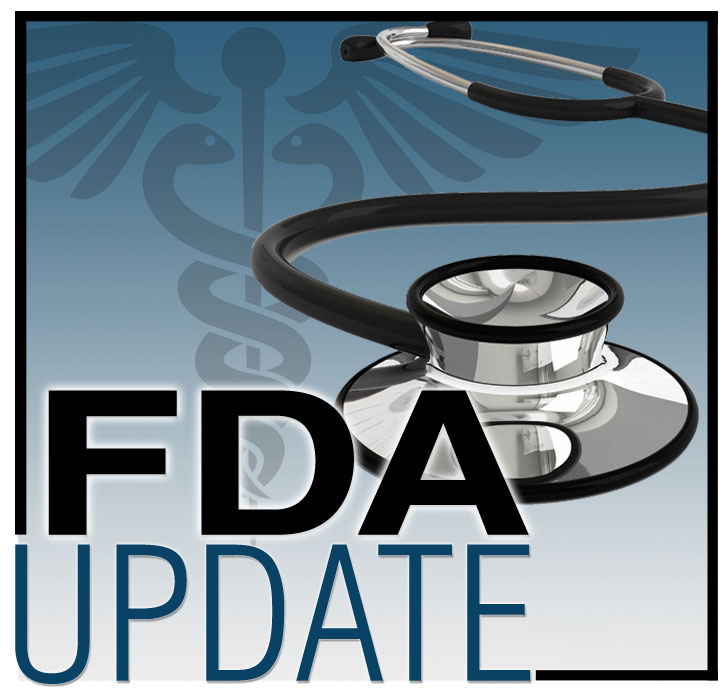FDA Grants Regular Approval to Osimertinib for EGFR T790 Mutation-Positive NSCLC

On March 30, 2017, the U.S. Food and Drug Administration (FDA) granted regular approval to osimertinib for the treatment of patients with metastatic epidermal growth factor receptor (EGFR) T790M mutation-positive non-small cell lung cancer (NSCLC), as detected by an FDA-approved test, whose disease has progressed on or after EGFR tyrosine kinase inhibitor (TKI) therapy.
In November 2015, osimertinib received accelerated approval for this indication based on an overall response rate (ORR) of 59% among 411 patients in two single-arm clinical trials.
The current approval is based on AURA3 (NCT012151981), a randomized, multicenter open-label, active-controlled trial conducted in patients with metastatic EGFR T790M mutation-positive NSCLC who had progressive disease following first-line EGFR TKI therapy. All patients were required to have EGFR T790M mutation-positive NSCLC identified by the cobas® EGFR mutation test performed in a central laboratory.
AURA3 randomized 419 patients (2:1) to receive osimertinib (n=279) 80 mg orally once daily or platinum-based doublet chemotherapy (n=140). Patients in the chemotherapy arm received either pemetrexed, 500 mg/m2 with carboplatin AUC5, or pemetrexed, 500mg/m2 with cisplatin 75 mg/m2), on day 1 of every 21-day cycle for up to 6 cycles followed by pemetrexed maintenance therapy. Patients on the chemotherapy arm with radiological progression according to both investigator and blinded independent central review were offered osimertinib at progression.
AURA3 demonstrated an improvement in investigator-assessed progression-free survival (PFS), with a hazard ratio of 0.30 (95% CI: 0.23, 0.41; p<0.001). The estimated median PFS was 10.1 months in the osimertinib arm and 4.4 months in the chemotherapy arm. Confirmed ORR, according to investigator assessment, was 65% (95% CI: 59%, 70%) and 29% (95% CI: 21%, 37%) in the osimertinib and chemotherapy arms, respectively (p<0.0001). Estimated median response durations were 11 months (95% CI: 8.6, 12.6) and 4.2 months (95% CI: 3.9, 5.9) in the osimertinib and chemotherapy arms, respectively.
In patients with measurable central nervous system (CNS) lesions on baseline brain scans, the confirmed CNS ORR, assessed by independent central review, was 57% (95% CI: 37%, 75%) and 25% (95% CI: 7%, 52%) in the osimertinib and chemotherapy arms, respectively. The median CNS response duration was not reached in the osimertinib arm (range: 1.4 to 12.5 months) and was 5.7 months (range: 1.4, 5.7 months) in the chemotherapy arm. Overall survival data are immature.
Serious adverse reactions were evaluated in 833 patients receiving osimertinib. The most serious adverse reactions were interstitial lung disease/pneumonitis (3.5%), QTc interval prolongation (0.7%), cardiomyopathy (1.9%), and keratitis (0.7%). The most common adverse reactions (occurring in at least 20% of patients) were diarrhea, rash, dry skin, nail toxicity, and fatigue.
The recommended dose of osimertinib is 80 mg orally once daily, with or without food, until disease progression or unacceptable toxicity. The presence of an EGFR T790M mutation in a tumor specimen, or plasma specimen (if tumor tissue is unavailable) should be confirmed by an FDA-approved test prior to initiation of treatment.
Full prescribing information is available (http://www.accessdata.fda.gov/drugsatfda_docs/label/2017/208065s006lbl.pdf).
FDA previously granted osimertinib Fast Track and Breakthrough Therapy Designation for the current indication, as well as Orphan Drug Designation for the treatment of EGFR mutation-positive NSCLC. A description of FDA expedited programs is in the Guidance for Industry: Expedited Programs for Serious Conditions-Drugs and Biologics (http://www.fda.gov/downloads/drugs/guidancecomplianceregulatoryinformation/guidances/ucm358301.pdf)
Healthcare professionals should report all serious adverse events suspected to be associated with the use of any medicine and device to FDA’s MedWatch Reporting System by completing a form online (http://www.fda.gov/medwatch/report.htm), by faxing (1-800-FDA-0178) or mailing the postage-paid address form provided online, or by telephone (1-800-FDA-1088).
In collaboration with the FDA and as a service to our members, ONS provides updates on recent FDA approvals and other important FDA actions (e.g., updated safety information, new prescribing information) pertaining to therapies for patients with cancer. This allows the agency to inform oncologists and professionals in oncology-related fields in a timely manner. Included in the FDA updates is a link to the product label or to other sites for additional relevant clinical information. In supplying this information, ONS does not endorse any product or therapy and does not take any position on the safety or efficacy of the product or therapy described.
